May 16th, 2022
It’s been a while since the blog was published. In truth, it’s hard to write something about wrestling when like many people, I was isolated from the community. One coach that I spoke to during the lockdown joked that it was the longest break I’ve ever had from wrestling. My response was that I had no idea of the week it was! For so many years, each day of my week was defined by a practice and when that was taken away from me, things were confusing to say the least.
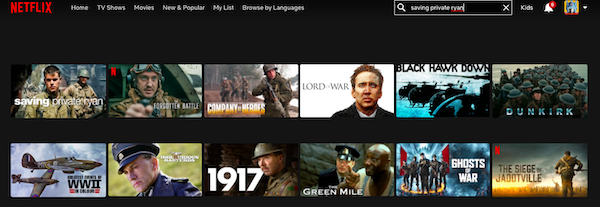
Lockdown involved a lot of introspection and Netflix
I guess this was both the best and worst time to lose my program but complete my ACD (Advanced Coaching Diploma). For those who aren’t familiar with the way the NCCP (National Coaching Certification Program) of Canada goes, you have various levels in which you need to complete in order to be able to coach at various age groups and levels of tournaments. The ACD replaces the old Level 4-5 in the previous system. However, the same standards are in place in that the higher the levels, the more time it takes to complete, the better your certification will be. So what does this mean for me? Well, it would in theory mean that my ability to coach at higher level tournaments should be better. However, this is not always the case. In reality the reason why I took and completed the course was to see if I could do it.

The INS (Institut National de Sport de Quebec) handles the ACD here in Quebec
(Photo property of the INS)
Let me explain the application process since there are many steps involved. It’s not enough for a coach to apply and be accepted to the program. The ACD program looks for candidates that fit a certain model of what they want their coaches to look like. In other words, a great amount of emphasis is placed on finding coaches that exemplify core values and ideals of what it means to be a coach. Therefore, the application process involved several steps:
- Getting letters of reference from both the Provincial and National Sports Federations, specifically the FLOQ and Wrestling Canada Lutte
- Preparing a CV of past coaching experiences at the National and International level that have yielded consistent participation and results
- A letter of intent as to why you want to enter the NCCP ACD
- An interview with several members of an evaluation committee to finalize your acceptance
After all this is said and done, you still must complete the program. This consists of two years, four modules and two major presentations. If this sounds akin to a Master’s Degree, in terms of format and workload, you’re not wrong.
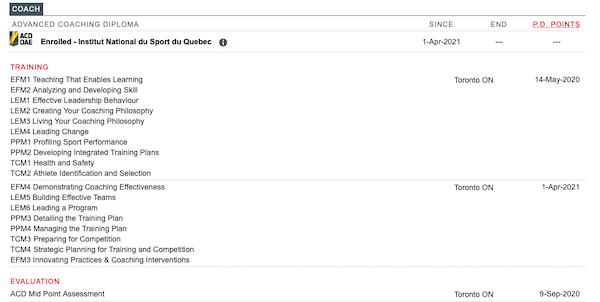
Just a list of the topics that I had to cover and submit research for in my first year!
Major emphasis was placed at the beginning of the course on developing and refining your coaching philosophy, as this would be the basis in which your research and testing would be guided by. My position as both a developmental and high performance coach yielded some interesting scenarios for this.
It should be noted that many of the coaches that I was taking the course with were seeking to become National Team Coaches, Coaches to major universities and past Olympians seeking to transition their careers from athlete to coach. This was also part of the appeal of taking the course, because while my coaching education at the Montreal Wrestling Club has afforded me a wealth of opportunity and experiences, hearing some different stories from other sports and from other coaches across the country was invaluable. Add this to the isolation we felt with the whole pandemic lockdown and my reasons for continuing the course start to become evident.
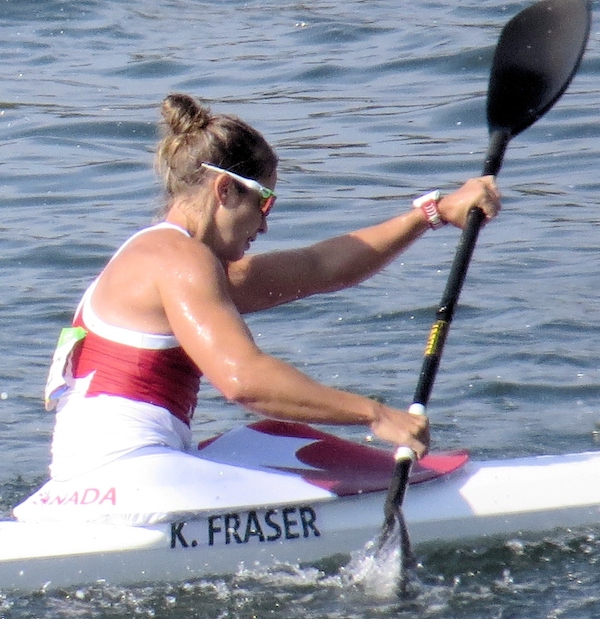
KC Fraser, a former Olympian was a person that fits this criteria and was in my coaching cohort for the ACD
(Photo property of Wikipedia)
The difficulty for completing the program presented itself early on, as we were entering the second term, we went into lockdown. It should also be noted that at this time, a staffing re-arrangement at my school, of which I had been employed at for over twelve years, caused me to lose my position. I was transferred to another school, losing my program that I had started from scratch and forced to begin anew. With heavy emphasis on testing and implementation of the theories we were getting from the ACD, this became a near impossible task, with both the lockdown and loss of my program. To say that I was distraught was an understatement.
As athletes, we always try to persevere through difficult situations, and this was no different. I tried instead to look for alternatives as to how I could complete the modules and also best represent myself and my sport. With the help of the facilitators, I was able to create a hybrid model, using my last remaining athlete from my old program to test out certain theories as well as hypothetical model in which way I wanted my program to go in the future. I doubt that if the situation wasn’t the way it was, I would have been able to do this.
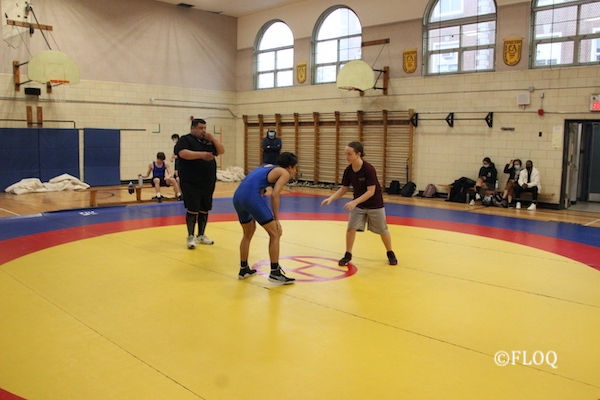
Royal West Academy is where I’ve started my new program
Regular attendance is required and you weren’t able to make it to the course, a completion or at the very least a perusal of the daily content was expected, along with feedback for the exercises involved later on that evening. While I was accepted to the program in Quebec, I actually completed my diploma through the Ontario cohort. The reason for this was pretty simple. While I did ace my interview, in French at the INS (Institut National de Sport), their schedule required that I be present in person every Tuesday in the morning for a three hour session and in the afternoon for another three hour session.
This format would require that I would have to leave my job as a high school teacher for two years since our daily schedule isn’t fixed and moves on a rotational cycle. This mean’s that my Tuesday’s schedules were never the same from one week to another. While I like idea of learning and self-improvement, I think that eating and paying my bills is just as important!
This was my first obstacle when starting this program. Rather than giving up, once again I looked for an alternative. My first alternative was to contact the NCCP in Alberta as I had heard that they offered morning courses that I might be able to attend virtually. Considering the time difference if their courses were offered in the morning, this might be an alternative as waking up early never really bothered me.
I was able to get in contact with their high performance institute and get a response to my question. Sadly, the situation was almost the same as in Quebec in that they would require mandatory presence. Only difference is that it would be on Tuesday and Thursday morning. Needless to say that if leaving my job for two years was impossible, leaving my job and moving out to Calgary for two years was even less appealing.
With that option done, I didn’t know what I was going to do. My last option was Ontario, and I reached out to their Coaching Association as my last resort. If that didn’t work, I don’t know if New Brunswick or Nova Scotia would be any better at this point since I didn’t know if they even offered the ACD there. After all, how many coaches are scrambling to get this certification, given the limited amount of opportunities to coach at a high level in this country?

The CSI Ontario was where I eventually ended up doing my ACD
(Photo property of Canadian Sport Institute Ontario)
I was contacted a few days later and set up a phone interview with the two facilitators. They informed me that the program could be done remotely, as they had coaches from all over the country taking part. Furthermore, they also told me that should I not be able to make it to the session on that day, I could catch up on the material on my own, and then complete the feedback exercises in the evening. They asked me if this would interest me, while also informing that they would welcome my enrolment. They gave me few days to think about this and in truth, I had a lot to think about. After all, the cost as well as the time invested was certainly a factor. As with many decisions, I sought the advice from my peers; my fellow coaches. I received a range of recommendations, ranging from “it would be a waste of time” to “I should definitely do it”. In the end, I ended up enrolling in the course.
Our first course was actually in person for a period of three days on the last weekend of August, a time that I was still in school which meant that I would have to take some time off. The good thing about this was that even though I had to head out to Toronto, the CSI would pay for my hotel, my parking and provide me with one meal a day. With that in mind, I headed out to Ontario to begin the course. The first weekend was a little overwhelming, as there was a lot to absorb. Given the calibre of people in the room who were taking the course, this also helped to reinforce in my mind the level of importance that was afforded to this course.
After the weekend was done, we went into a remote style class, with another in-person meeting scheduled for around May or June. Little did we know that we would be locked down, with limited contact for the next two years. In the end, we never ended up meeting again in person since at the time of writing, things are just beginning to open up. Needless to say, these last two years have been a bit of a rollercoaster ride.
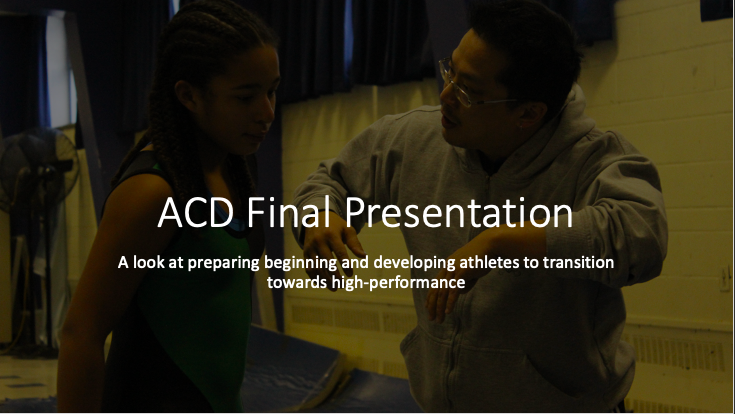
This was the subject for my final presentation that according to my evaluators, I presented extremely well
I could continue writing about all the things that happened in the two years of my education in the ACD, starting with the many meetings with my Mentor Coach, to the numerous correspondences I had with the guest lecturers and facilitators. I could describe the feelings of uncertainty that I had throughout the course, wondering if I was over my head, or if the benefits in the end would be worth the time and money invested into this program. I could also talk about the copious amounts of knowledge that I picked up and how the ACD has refined some things that I do as a coach. I could talk about the levels of anxiety that I had both for my mid-year assessment to my final presentation, knowing that if something was not justified properly, would hinder my ability to pass the course. I think that could be a subject for another blog. In the end, I came away from the program with some new insights as well as a greater appreciation of what it takes to become a high performance coach, thereby making my journey through the ACD well worth my time.
